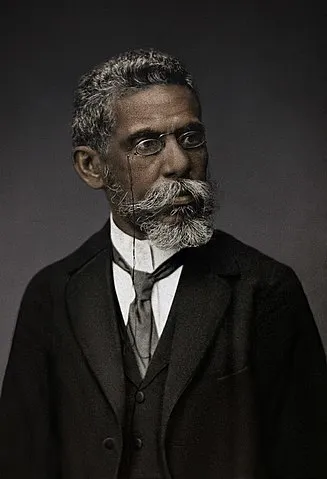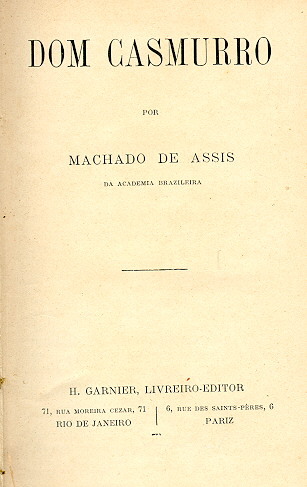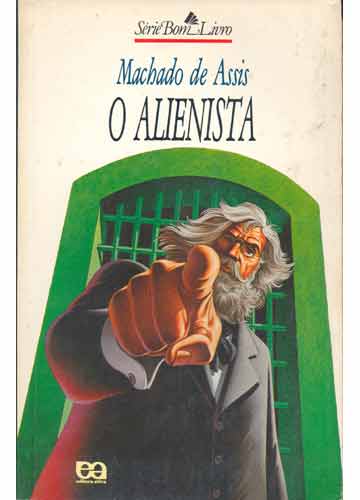Joaquim Maria Machado de Assis, born on June 21, 1839, in Rio de Janeiro, is widely considered one of the greatest writers in Brazilian and world literature. The son of a wall painter and a laundress, Machado faced numerous financial and social challenges throughout his life, but his passion for reading and writing propelled him to overcome these barriers and become a central figure in Brazil’s literary panorama.
Machado’s extensive body of work consists of ten novels, 205 short stories, ten plays, five collections of poems and sonnets, and more than six hundred chronicles. His writing evolved over time, reflecting psychological depth and a unique ability to critique Brazilian society of his era. In 1897, he founded the Brazilian Academy of Letters and was elected its first president, a position he held until his death in 1908. His leadership in the Academy helped to establish the institution as a pillar of Brazilian literary culture.

Major Works of Machado de Assis
Quincas Borba
“Quincas Borba” is a novel published in 1891 that tells the story of Rubião, a simple primary school teacher who inherits the fortune and philosophy of an eccentric friend, Quincas Borba. The philosophy of “Humanitism,” created by Quincas Borba, is a parody of the positivist and evolutionist doctrines of the time. Upon moving to Rio de Janeiro, Rubião becomes involved with high society and eventually loses his fortune and sanity, illustrating the fragility of human convictions in the face of life’s adversities.
Dom Casmurro
Published in 1899, “Dom Casmurro” is perhaps Machado de Assis’s most famous novel. The book is narrated by Bento Santiago, known as Dom Casmurro, an aged man who decides to write about his youth to try to explain the events that led him to doubt his wife Capitu’s fidelity. The ambiguous and subjective narrative leaves the reader uncertain whether Capitu actually betrayed Bento, making the book a masterpiece of psychological realism.

The Psychiatrist (O Alienista)
“The Psychiatrist” (“O Alienista”), originally published as part of the short story collection “Papéis Avulsos” in 1882, is a scathing satire that exposes the thin line between sanity and madness. The story revolves around Dr. Simão Bacamarte, a renowned physician who decides to establish an asylum called Casa Verde to study and treat mental illnesses in Itaguaí. As Bacamarte increasingly broadens his definition of madness, committing a growing number of citizens, the narrative questions notions of normality and power. Through ironic criticism, Machado de Assis addresses themes such as authoritarianism, the arbitrariness of science, and the vulnerability of social institutions, showcasing his mastery of humor and social analysis.
The Posthumous Memoirs of Brás Cubas
“The Posthumous Memoirs of Brás Cubas,” published in 1881, is a landmark in world literature and one of the first works of realism in Brazil. The novel is narrated by Brás Cubas, a “deceased author” who decides to tell his life story after death, free from social conventions. The narrative is characterized by its irony, biting humor, and social critique, addressing themes such as human vanity, hypocrisy, and corruption. Machado’s narrative innovation and irreverent style make this book an essential read.

The Influence of Machado de Assis
Machado de Assis’s work continues to inspire readers and critics around the world. A recent example is cultural influencer Courtney Novak, who in a video about “The Posthumous Memoirs of Brás Cubas” expressed her enchantment and frustration with the book:
“I have three problems with this book: First, my edition only has 300 pages; there are just 100 more to go. If I’m very careful, it will last until the weekend, but then what? What will I do for the rest of my life? Why didn’t you warn me that this is the best book ever written? And finally, now I’ll have to learn Portuguese, thank you very much!”
Courtney Novak’s statement highlights the timeless relevance and profound impact of Machado de Assis’s work, which continues to captivate and challenge readers from all over the world, proving the universality and genius of his writing.








